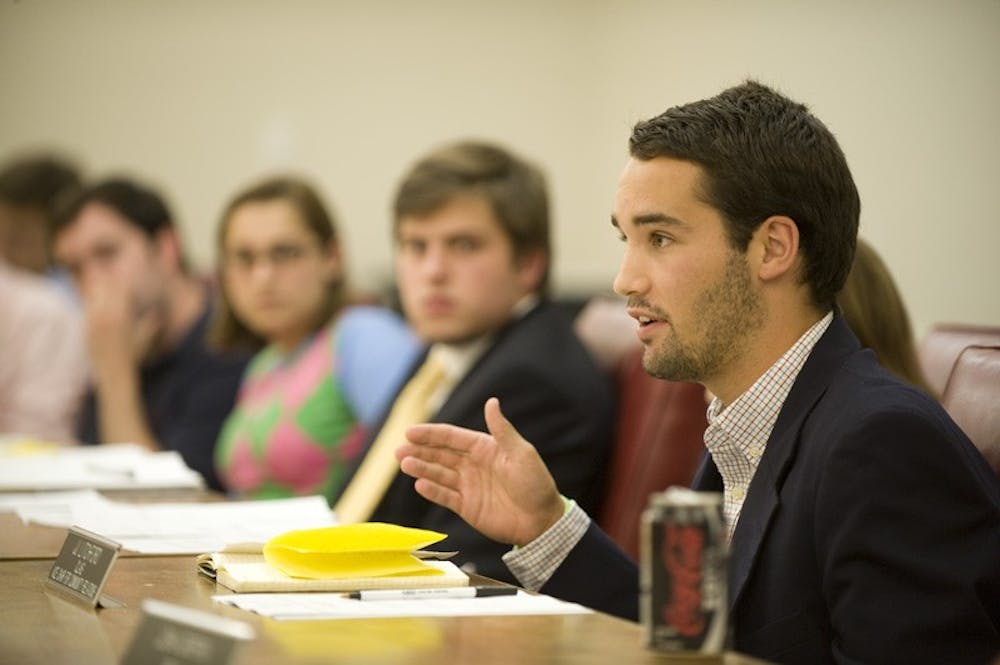As a semester filled with discussion and potentially impactful changes comes to a close, Honor Committee members already are planning a series of forecasted spring election amendments that aim to improve debated aspects of current trial and juror processes.
While the Committee focused on a number of topics during the course of this semester, two of its most significant approved changes were a Semester at Sea amendment and a plagiarism supplement.
Under the new Semester at Sea amendment, which passed 20-0 on Nov. 15 and was proposed by Committee Chair David Truetzel, any student who is found guilty of an honor offense while on the voyage will have an opportunity to request additional proceedings with Committee members in Charlottesville to re-investigate the case. After the re-investigation, if the Committee members determine that an honor offense did not occur, the case will be dropped. If the Committee believes that an honor offense likely occurred, though, a second trial will be held for the student in Charlottesville. At this second trial, if the student is a University student and is found not guilty, he or she can be readmitted to the University. Non-University students who are found not guilty can apply or transfer to the University in the future.
Under the Committee's former Semester at Sea policy, any student found guilty of an honor offense on the ship was expelled from the program and expelled from the University if he or she was a University student at the time of the voyage. If the convicted student did not attend the University, he or she was barred from applying or transferring to the University in the future.
The plagiarism supplement, which was created by Vice Chair for Community Relations J.J. Litchford and first presented Sept. 20, was passed by a 19-0 vote Nov. 22. The supplement is "designed to elaborate on one element of cheating - plagiarism - with a particular emphasis on one kind of potential plagiarism - paraphrasing the ideas or work of another,"
The addition to the definition states that plagiarism is committed if the reader can "match your words and phrasing with those of your source" and quotation marks have not been used - even if the paraphrase has been cited. The modified definition will be added to the Committee's "green book," a handbook that explains the Committee's policies and procedures.
Truetzel said the Committee overall was excited to pass the two changes that "took a lot of work and compromise." Looking back, however, he said while he believes the two items were complex and deserved the Committee's time, it "would have been nice if we could have moved a little bit faster."
Other committee members echoed Truetzel's sentiments.
Vice Chair for Education Rob Atkinson said he thought the Semester at Sea amendment was a positive change but a time-consuming one. Overall discussion on it "took an inordinate amount of time in terms of how much it factors into honor around Grounds," he said.
Vice Chair for Trials Alex Carroll similarly said she would also like to see discussion move more quickly next semester, but said she is nevertheless pleased that there is a difference of opinion in the Committee.
"We're hearing issues that the student body is actually concerned about," Carroll said.
In an effort to speed up some discussions, Truetzel said he plans to get a head start on some future goals during Winter Break so that the Committee can take action immediately in January. One of these goals is to discuss and pass several constitutional amendment proposals before the University's spring elections.
According to the Committee's constitution, amendments must first be proposed by a two-thirds vote of the entire Committee, and then be voted upon by the student body during the spring elections. The deadline to ensure that any proposed amendments make the ballot is Feb. 14, leaving the Committee little time to propose, discuss and vote upon any amendments that might be put forth, Truetzel said.
Truetzel said the Committee will look at three amendments in particular. The first would clarify the language regarding the steps necessary to get amendment proposals on the ballot for elections. The second proposal will take a look at "multiple jury panel compositions," and create a procedure through which two students who are being tried together could request different jury compositions. The third possible proposal would change the number of guaranteed jurors from an accused student's school during a trial.
Truetzel said the Committee has yet to finalize proposals for any of the three amendments and will continue discussion of them from now until the time when it needs to vote.







